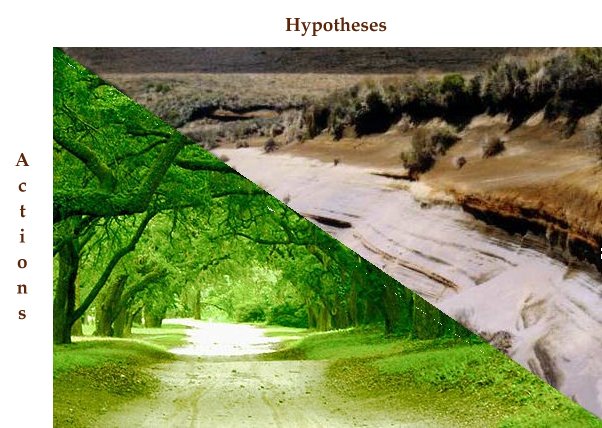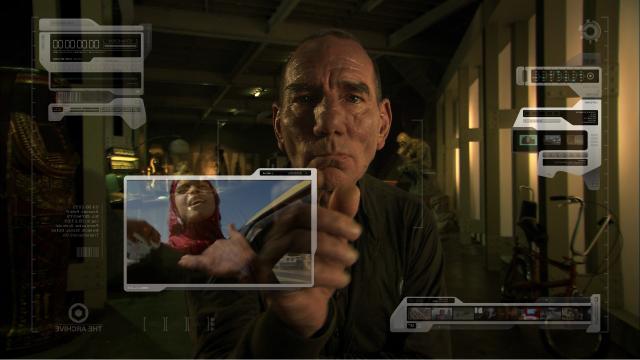A speculation on the possibility of the accurate prediction of future, hind-sight based, historical worldviews, and the application of such prediction to the current climate change debate.
Pragma - mass noun: the practical outcome of a decision-based action as viewed from a historical perspective. Pragma is to science and politics as karma is to spirituality.
"This is not just some intellectual argument between people who think they know the answer, we are talking about the future of the globe.
...
... I see lots of assertion but it's not backed up. It's very dangerous and like playing Russian roulette with the planet."
Prof Peter Liss, acting director of the University of East Anglia's
Climatic Research Unit (CRU) 12 Feb 2010
telegraph.co.uk
Russian roulette uses one bullet and five empty chambers. The odds are in favor of the player. On that basis I am forced to conclude that Professor Liss has committed a ludic_fallacy: he is being unduly optimistic about our future chances of survival.
Logic vs Belief
There are some aspects of human decision-making processes which are not amenable to purely scientific and logical discussions or solutions. Different people have different grounds for supporting one side or the other of a debate. The classic instance is debate between people of scientific and people of religious persuasions.
In parallel with the science vs religion debate has been what I would call the 'small human - big planet' debate: people are divided as to whether or not we small humans can adversely affect our relatively big planet. The debate about whether or not humans can affect the planet as a whole is not of recent origin. It goes back a very long way in written human history, and even longer in myths and legends.
... there was abundance of wood in the mountains. Of this last the traces still remain, for although some of the mountains now only afford sustenance to bees, not so very long ago there were still to be seen roofs of timber cut from trees growing there, which were of a size sufficient to cover the largest houses; and there were many other high trees, cultivated by man and bearing abundance of food for cattle. Moreover, the land reaped the benefit of the annual rainfall, not as now losing the water which flows off the bare earth into the sea, but, having an abundant supply in all places, and receiving it into herself and treasuring it up in the close clay soil, it let off into the hollows the streams which it absorbed from the heights, providing everywhere abundant fountains and rivers,
Plato, critias, 360 BCE
Deciding the undecidable
Sometimes neither side of a debate can conclude the argument by convincing the other side of the truth. In such cases the only option seems to be to 'wait and see', after which one side can say to the other: "I told you so!". There is another option, however, the pragma option. The two sides can examine all possible practical outcomes of accepting one or another viewpoint as being true. The two sides can look at all possible outcomes of action or inaction based on their opposing views. They can look at the possible and reasonably likely outcomes of being right or wrong. They can then perform a cost-benefit analysis of these outcomes.
The pragma hypothesis:
Put informally:
our descendants will view our current policy choices according to whether they enjoy the fruits or bear the burdens of our current actions.
More formally:
when the parties to a debate cannot or will not resolve alternate views of reality for the purpose of policy-making, it is entirely predictable that history will reveal which policy would best have been adopted.
By analysing the reasonably predictable alternative choice-based outcomes it is possible for the different parties to make a combined, rationally informed policy choice in the shared belief that hindsight will reveal that policy to have been well chosen.
We can convert the pragma hypothesis into a form for practical and general application. Undebatable issues can be addressed with a rationalisation model, or pragmatic assessment model. The model, a generalisation of Pascal's wager, shows:
Hypotheses H1, H2 ... Hn - the disputed realities as believed or hypothesised;
Actions A1, A2, ... An - the alternative forms of action or inaction;
Results RH1,A1, RH1,A2,, RH2,A2 ... RHn,An - the possible resultant outcomes .
Having charted the disputed facts or beliefs we can now choose the pragma option: a pragmatic choice of policy based on a cost-benefit risk assessment of each possible policy adoption. This is somewhat equivalent to viewing the problem using the 'exact science' of hindsight.

Discussion:
In our distant future, if humans survive whatever hazards the future brings, what will people know or say about their past? Will they thank this age of wisdom, or curse this age of stupid? Will they remember us only in myths and legends? Do we still have a say in the matter?
... the virtues and the laws of their predecessors, they knew only by obscure traditions; and as they themselves and their children lacked for many generations the necessaries of life, they directed their attention to the supply of their wants, and of them they conversed, to the neglect of events that had happened in times long past; for mythology and the enquiry into antiquity are first introduced into cities when they begin to have leisure, and when they see that the necessaries of life have already been provided, but not before.
Plato, critias, 360 BCE

Image source:
http://www.ageofstupid.net/





Comments